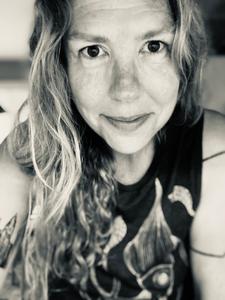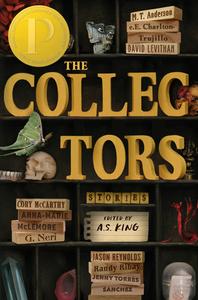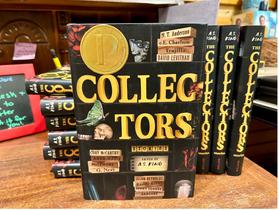
|
|
| A.S. King | |
On Monday morning, the American Library Association announced its 2024 Youth Media Award winners. The Collectors: Stories (Dutton Books for Young Readers), edited by author A.S. King, won the Michael L. Printz Award for Excellence in Young Adult Literature. This anthology features 10 stories written by King and authors M.T. Anderson, e.E. Charlton-Trujillo, David Levithan, Cory McCarthy, Anna-Marie McLemore, G. Neri, Jason Reynolds, Randy Ribay, and Jenny Torres Sanchez.
You are no stranger to the Michael L. Printz Award, having been honored for your 2010 title, Please Ignore Vera Dietz, and winning the award for 2019's Dig. It's been only four years since you won this award--that time, it was a solo award. Now you're sharing it with nine other authors. How does it feel?
It feels like the most amazing party, really. To assemble a team like this, ask them to show me their weirdest selves, and then edit some of the best stories I've ever read was daunting and exciting. But mostly, it feels like this is a sort of family. When people go weird, they also tend to go deep. We see and support one another's struggles. We grow with our words. To do that in a collective is magic. So, how does it feel? It feels like magic.
This title is a collection of 10 stories written by you and a group of people you call in your intro "nine of my favorite YA authors." Did you personally choose and approach the authors?
Yes, I approached the authors and told them I was looking for a story that fit two parameters: (1) It had to be about a collection and/or its collector; and (2) It had to be weird. I said, "Be defiantly creative." I said, "There is emotional currency in weirdness." If you read the first paragraph of my introduction, you will see a piece of the e-mail I sent: a list of the things we can collect, from dryer lint to insults. All the writers I approached said yes, and I felt incredibly lucky.
 Had you edited an anthology before? How did it feel to look at the stories for the first time?
Had you edited an anthology before? How did it feel to look at the stories for the first time?
I had always wanted to edit an anthology and had mentioned it to my agent many times, but I never had a clear idea. This time was different--I woke up from a dream, wrote down the idea, and, within a week or two, had a proposal ready.
Reading short stories with an eye to edit is not new to me. I taught short story at the MFA program where I used to work and continue to teach short form in my Story Club workshops.
As for how it felt... I remember reading each story for the first time and walking with it for a few days, going back to the scribbled-on pages and really thinking about what the story was about, and what each author was trying to say. Every time, I was thrilled to read a story that hadn't been read before. And every time, the story blew me away. I just remember a massive feeling of gratitude. Same as I feel now.
So, were they "as weird as they wanted"?
I said, "There are no rules" to 10 weirdos, so it was bound to be fun. Some authors were concerned that they didn't go weird enough and some thought theirs might have gone too far. My job was to reassure them that each story was brilliant and help them see it the way I saw it: as a perfect part of a whole, yet-undefined artifact. The editing work itself was more fun than I've had in a long time. But it was also daunting. I mean, some of these writers are my close friends. Some I consider family. Some are writers I admire but don't know very well. One is my actual editor. This part was the hardest: how to be editor-Amy and still be Amy. I think I managed it while also having a ton of fun with the work at hand. There isn't much difference between the Amys, I guess.
As for if they were weird? Yes. Very much so. Look at the rich surrealism in e.E. Charlton-Trujillo's "La Concha" (a good pairing with my own "We Are Looking for Home") and the intense structure of Jason Reynolds's "A Recording for Carole Before It All Goes." G. Neri's "Pool Bandits" was surprisingly weird for what feels like a straight-up story because his nonfiction voice came through and layered satisfying doubt, while David Levithan's "Take It from Me" showcased his eye to the whimsy of detail. Each author approached things in their own way, and I enjoyed those singular ways.
These stories are weird and creative: there's an unwanted collection of men, a demon who collects souls out of hatred, a White Savior who simply can't stop "saving" people who don't need her help.... How do you feel about this book as a completed project?
There was a feeling I got when I read certain stories; they saw their place as I read them. I knew Anna-Marie McLemore's "Play House" was going first. It also happened to be the first story I received. But I knew, without even seeing the others (or finishing my own) that it was the opener. It just... said so. I approached the assembly of the book the same way I would a story or novel--blindfolded and winging it. I trusted my gut. I knew M.T. Anderson's "Sweet Everlasting" was the closer--the theme was right there in the piece. I knew Randy Ribay's "The White Savior Does Not Save the Day" was a necessary topic woven through fantastically weird narrative choices and had to go near the beginning. And I knew Cory McCarthy's groundbreaking "Museum of Misery" was going to have to pop from the ditch of the book--a story about deep struggle right there in the heart. The finished project felt complete, as if I'd solved a puzzle.
Did you have a reader in mind when you dreamed up this collection?
I am an ardent supporter of teenagers who live in a world that is set up to make them feel small for simply being teenagers while they simultaneously navigate normalized violence that the adults around them deny. So, when I said that there is emotional currency in weirdness, I mean that I believe there is an extra component in weird fiction for teen readers that allows them to feel seen on a very trauma-informed level. For me, that is the reader I always aim for. The young person who is denied their lived experience because it makes adults uncomfortable. That's most young people. Look at "Ring of Fire" by Jenny Torrez Sanchez for a glimpse into how something as common as children's grief is often ignored by the adults around them.
How are you going to celebrate with your co-authors?
I haven't begun to think about this. I aim to take it slowly and take the whole year to celebrate. I mean, why not? If I win the Powerball, I might rent us a big house on a beach somewhere for a week of swimming and writing and being pampered. But I don't play Powerball, so I need to pick up the slack, I guess.
 |
|
| At Aaron's Books | |
Is there anything else you'd like to add or tell Shelf Awareness readers?
I simply wouldn't be the author I am without teachers, librarians, and independent booksellers. Because I know the Shelf Awareness crowd, I can't leave this interview without highlighting my career-long relationship with Sam, Todd, and Aaron Dickinson of Aaron's Books in Lititz, Pa. Aaron's Books has supported me through 15 years of publishing, and they are family. My first stop today was the bookstore. Of course it was. I went and put a few gold Printz stickers on copies so they would have the first chance to sell The Collectors as the award winner.
A lot of people have asked me how I feel today. I feel a lot of things, but mostly I feel grateful. For every author who said yes and wrote me a beautiful story, for my editor who plucked me from obscurity back in 2007 after 15 years of writing and 500 rejections, for my agent who looks after me, for my writing family--they all know who they are--and for booksellers like you who handsell my books to the people who need them. My gratitude is Jupiter-sized. None of us could do this without you. Thank you. --Siân Gaetano, children's and YA editor, Shelf Awareness

